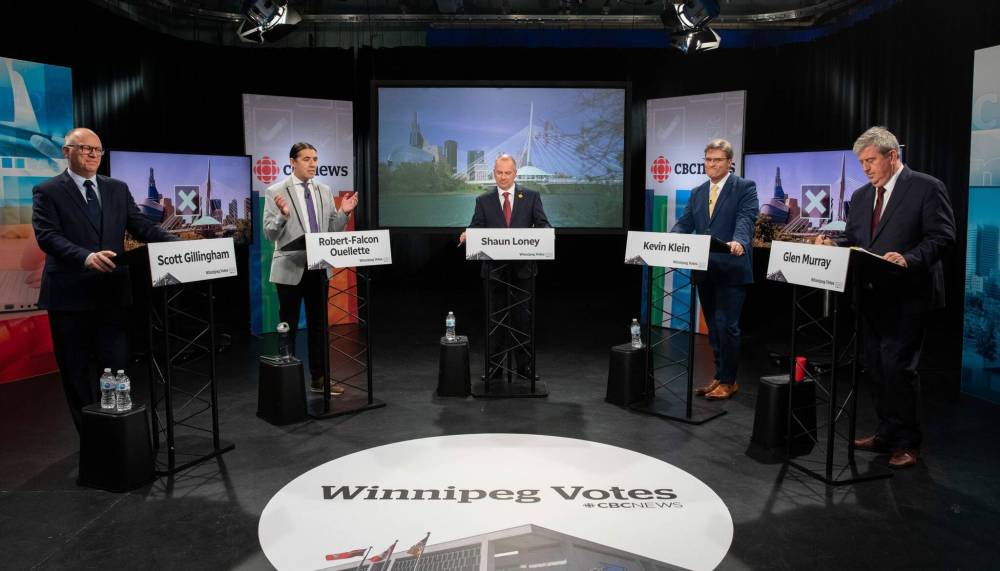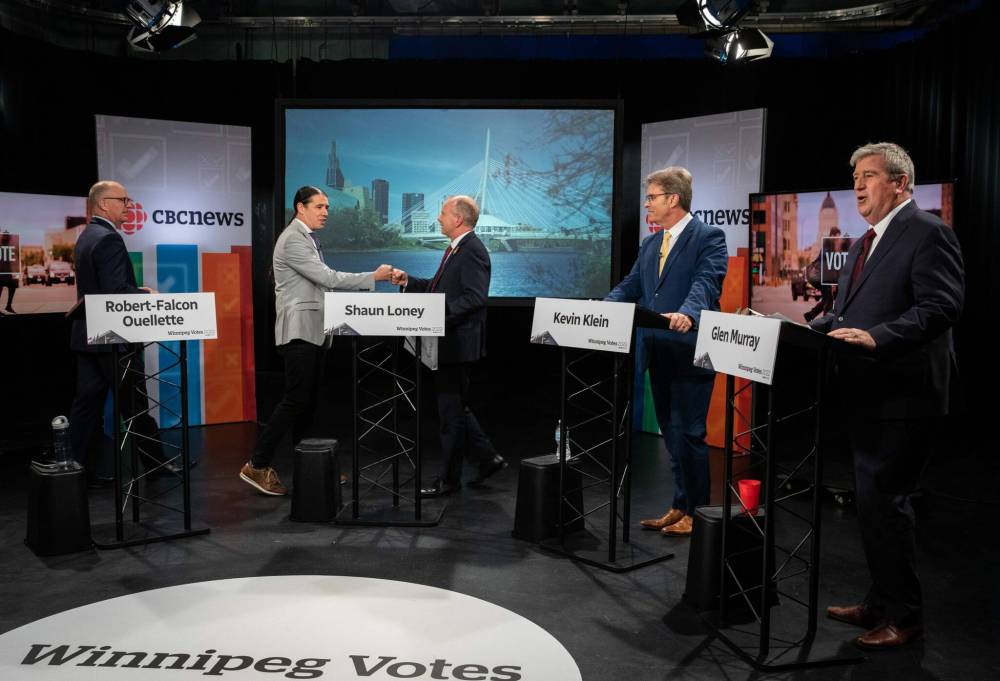Pledges, platforms and put-downs dominate CBC debate
Five Winnipeg mayoral candidates verbally duke it out on live TV
Advertisement
Read this article for free:
or
Already have an account? Log in here »
To continue reading, please subscribe:
Monthly Digital Subscription
$0 for the first 4 weeks*
- Enjoy unlimited reading on winnipegfreepress.com
- Read the E-Edition, our digital replica newspaper
- Access News Break, our award-winning app
- Play interactive puzzles
*No charge for 4 weeks then price increases to the regular rate of $19.00 plus GST every four weeks. Offer available to new and qualified returning subscribers only. Cancel any time.
Monthly Digital Subscription
$4.75/week*
- Enjoy unlimited reading on winnipegfreepress.com
- Read the E-Edition, our digital replica newspaper
- Access News Break, our award-winning app
- Play interactive puzzles
*Billed as $19 plus GST every four weeks. Cancel any time.
To continue reading, please subscribe:
Add Free Press access to your Brandon Sun subscription for only an additional
$1 for the first 4 weeks*
*Your next subscription payment will increase by $1.00 and you will be charged $16.99 plus GST for four weeks. After four weeks, your payment will increase to $23.99 plus GST every four weeks.
Read unlimited articles for free today:
or
Already have an account? Log in here »
Hey there, time traveller!
This article was published 19/10/2022 (1146 days ago), so information in it may no longer be current.
Five Winnipeg mayoral candidates were grilled Wednesday over their tax plans, proposals to tackle crime and even reopening Portage Avenue and Main Street to pedestrians, yielding one tax-freeze commitment and a few other surprises.
Scott Gillingham, Kevin Klein, Shaun Loney, Glen Murray and Robert-Falcon Ouellette faced off during a live televised debate at CBC Manitoba’s downtown studio.
Murray stood out as the only candidate who promised not to raise property taxes, arguing inflation is placing too heavy a burden on Winnipeggers right now.

“I’m proposing a whole series of measures that would build the tax base… that would not cause an increased tax burden (on Winnipeggers),” he said.
Murray later told reporters that even if he can’t convince the provincial government to give the city the revenue from one percentage point of the provincial sales tax, as he has proposed, he still wouldn’t raise property taxes.
“We will not increase taxes,” he said.
Gillingham was criticized by Loney for his plan to raise property taxes by 3.5 per cent in each of the next four years and add $1.50 per foot to frontage levies in 2023.
“Winnipeggers are struggling to pay for their groceries, mortgage, rent and heating… (and) you know darn well these actually add up to an (equivalent property tax) increase of 7.5 per cent,” said Loney.
Gillingham stressed his tax plan is both straightforward and necessary.
“It’s time to invest in Winnipeg right now and Winnipeggers understand that… We need to raise revenue so that we can invest in increased services,” he said.
Gillingham was put on the hot seat repeatedly, with three out of four candidates using a brief chance to question other candidates to direct an inquiry at him.
When asked who would reopen Portage and Main to foot traffic, only Loney said he would do so. Klein said he wouldn’t before clarifying his stance could depend on the cost to replace the barriers after repairs at the site take place.
“We have to fix the membrane of Portage and Main… If once the membrane is fixed, if it’s more cost-efficient not to put up the concrete, we won’t put it back up,” he said.
Following the debate, Murray told reporters his preference to not reopen the intersection is meant to respect a 2018 plebiscite, when 65 per cent of Winnipeggers voted against reopening the intersection.
“If you don’t respect that, then how does anyone have any confidence in a referendum?” he said.

The candidates also shared plans to combat high crime rates, with Klein firmly rejecting calls to shift resources away from police.
“A social worker is not going to respond to a call without the backup of a police officer. We need to get more of our trained (officers) on the streets… We need to make sure that they have the money to do their job,” he said.
Ouellette rejected that argument, saying the focus must shift to the root causes of crime.
“For far too long, these politicians have been saying, ‘more police, more police, more police. (The solution) is not going to be policing,” he said.
Loney accused the other candidates of not “thinking nearly big enough” on improving public safety, arguing his plan to create social-enterprise jobs and hire people with barriers, such as criminal records, would do more to improve safety.
“Nothing stops crime like a job,” he said.
A few pointed personal remarks were also shared. Gillingham grilled Murray on allegations related to his past work record, including his time at the Pembina Institute energy think tank in 2017-18.
“You would not get a job in this city with that resume. How can you ask the people of Winnipeg to ignore years of unacceptable behaviour?” said Gillingham, later adding, “You’re not fit to be the mayor of our city.”
Murray said the debate should move past personal attacks, then argued his record as Winnipeg’s mayor from 1998 to 2004 was positive.
“I provided and supported a respectful (workplace),” he said.
In recent news reports, some former Pembina Institute staff claimed Murray was forced out of the role following complaints about his “chaotic” management. One staff member also accused Murray of sexual harassment at a social event, which Murray has repeatedly denied.

During a segment where candidates were asked to respond by displaying “Yes” or “No” via hand-held signs, Gillingham and Klein were the only two to say they would not work to create supervised drug-consumption sites. None of the candidates said they would abolish the photo-radar program, while Klein was the sole candidate to say he would not expand the city’s rapid-transit system.
While there are 11 candidates competing to become Winnipeg’s next mayor, CBC restricted its debate invites to those who polled above 10 per cent support (after factoring in the margin of error) in a Probe Research poll released in late September.
That meant candidates Jenny Motkaluk, Idris Adelakun, Rana Bokhari, Chris Clacio, Rick Shone and Don Woodstock were not invited.
Motkaluk highlighted her exclusion by gathering with about 10 supporters outside the CBC building to march and wave campaign signs during rush hour.
“We decided to do (this) in front of the CBC today to reflect the fact that the CBC thinks they get to decide the outcome of the election by refusing to give me the platform of being in the mayoral debate today,” said Motkaluk.
— with files from Malak Abas
joyanne.pursaga@freepress.mb.ca
Twitter: @joyanne_pursaga

Born and raised in Winnipeg, Joyanne loves to tell the stories of this city, especially when politics is involved. Joyanne became the city hall reporter for the Winnipeg Free Press in early 2020.
Our newsroom depends on a growing audience of readers to power our journalism. If you are not a paid reader, please consider becoming a subscriber.
Our newsroom depends on its audience of readers to power our journalism. Thank you for your support.
History
Updated on Wednesday, October 19, 2022 9:55 PM CDT: Full write thru by Joyanne Pursaga with extra info, new quotes





